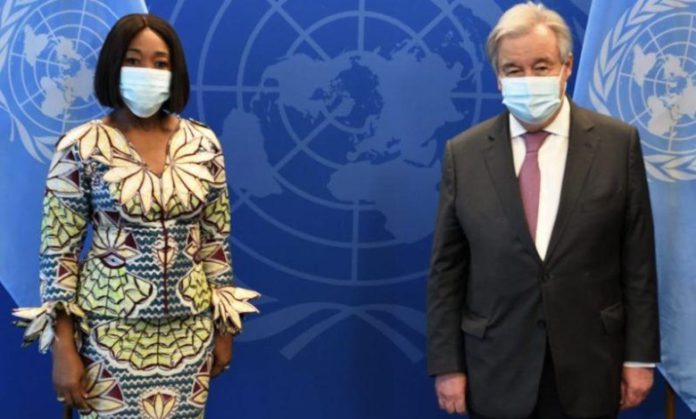
Ghana’s Minister for Foreign Affairs and Regional Integration on Tuesday held discussions with the UN Secretary-General on the security situation in the Sahel and West Africa.
Madam Shirley Ayorkor Botchwey and Antonio Guterres discussed ways to mobilise funding sustainably for peace operations in Africa, in the closed-door engagement.
The meeting was attended by three other senior officials from the ministry.
It is the first meeting since Ghana took a seat on the 15-member Security Council on January 1, 2022.
Ghana was elected last June for two years, alongside Brazil, United Arab Emirates, Gabon, and Albania to join five other non-permanent members, including Kenya, who has a year left of their tenure.
Restoring peace and security in the Sahel and West Africa, and ending piracy in the Gulf of Guinea are two of the major problems on the continent, which Ghana wants to galvanize the Security Council’s attention and international resources to resolve.
Ghana chairs the African Union (AU) Peace and Security Council as well as the Council of Ecowas Heads of State.
Madam Botchwey also participated in the UN Security Council’s first debate for Ghana in this fourth tenure on the Council since independence in 1957.
The debate under the theme Women, Peace and Security was presided over by Norwegian Foreign Minister, Anniken Huitfeldt.
It addressed the threats and violence women in particular face in their bid to work for peace.
In 2020, the Office of the UN High Commissioner for Human Rights verified 35 cases in which women involved in peace and security work were killed.
They included human rights activists, journalists and trade unionists in seven conflict-affected countries. Academics, judges, youth and civil society activists also suffered violence, the report said.
ALSO READ:
The Minister said Ghana was concerned that those who gave their time to make the world a better place were rather threatened. “The Council can always count on Ghana’s unwavering support.”
She said the Ghana Armed Forces and other security institutions were reviewing regulations to ensure they were women-friendly.
The debate topic is of particular relevance to Ghana because the country is the ninth leading contributor of personnel to UN peace-keeping operations in which an increasing number of Ghanaian women are deployed.
As of April 2020, more than a quarter of Ghanaian police and 14 per cent of its military personnel sent on UN and African Union peace operations were women.
“Women are usually the most adversely affected by conflict but the most marginalised in peace processes, and the most punished for their peace-building efforts,” she said.
She added, “therefore, ensuring the full, equal, and meaningful participation of women in peace-building should not be reduced to mere rhetoric within the confines of the Security Council.
“We owe it to women in peace and security all over the world to convert the rhetoric into zealous and concrete action.”
